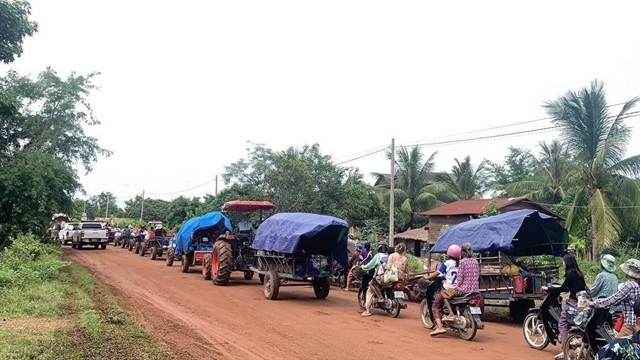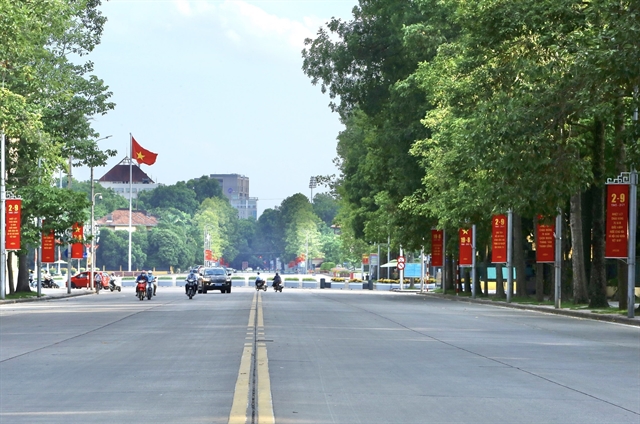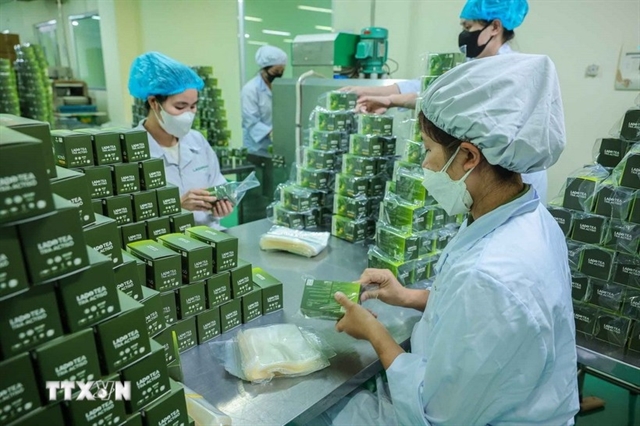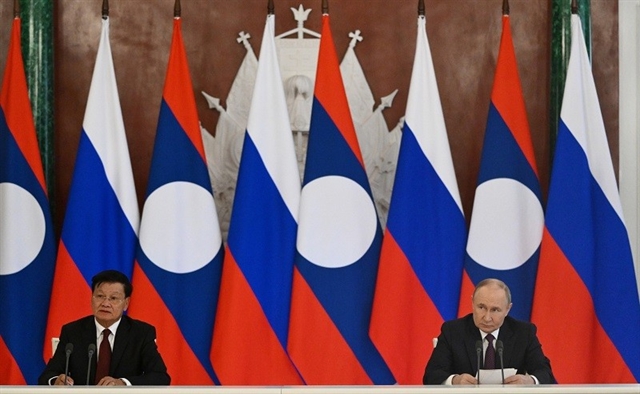

This is the Year of the Dog.
Dogs have a place in the life and culture of Việt Nam.
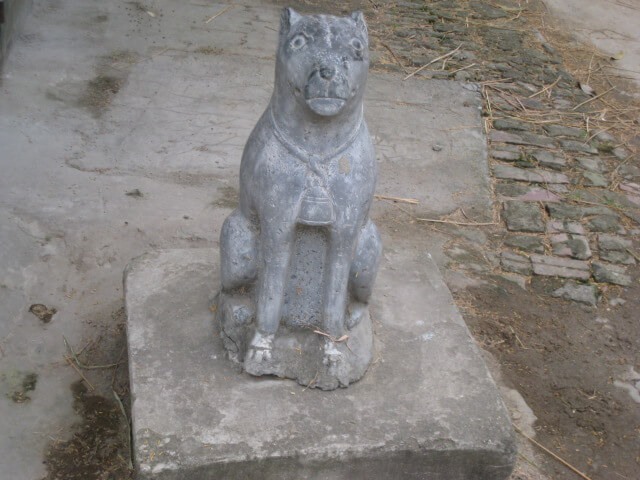 |
| Residents of many localities across the country during the era of the monarchy created and worshipped stone dogs, placing them in front of community temples, home entrance gates or at an altar in their front yards. Photo langdamynghe.com |
This is the Year of the Dog.
Dogs have a place in the life and culture of Việt Nam.
In the past they were most often working animals, providing protection.
Now, dogs are often loving companions to their owners.
Phước Bửu
The country has welcomed the Lunar New Year, and 2018 is the Year of the Dog.
The dog is the favourite domestic animal of the Vietnamese. As the country celebrates the New Year, stories about dogs can be heard everywhere.
In ancient times, when life was completely dependent on farming and husbandry, the Vietnamese used to keep six domestic animals – dogs, horses, goats and pigs, as well as buffalo and chickens. As in many countries around the world, dogs were the closest among these to humans, and they always shared the living space of people, while the other animals lived in sheds or cages.
Dogs were raised for both domestic and farming and husbandry needs. At home, they assisted people in looking after their property; while in the field, they helped to drive away attackers from the cultivated land. Psychologically, dogs acted as companions for those working alone in the wild or in the fields.
The dog thus has its own position in Vietnamese culture. According to one study, dogs find mention in almost 70 Vietnamese proverbs and sayings, some of which are commonly used by the people in their daily communications.
“Chó ngáp phải ruồi”, or “The dog got a fly in its mouth while yawning”, refers to a coincidence or someone’s achievement being caused by luck. “Chó già giữ xương”, or “The old dog holds the bone”, describes an incapable person who is nevertheless greedy for a position or property.
Proverbs also mention the bites of a dog. “Chó cắn áo rách”, or “Dogs bite the torn shirt”, describes a troubled person getting into another trouble. “Chó càn cắn giậu”, or “The angry dog bites the fence”, refers to a person overreacting in anger. “Chó cái cắn con”, or “The bitch bites her babies”, describes the cruelty of a woman towards her children.
Many Vietnamese raise dogs at home. Some treat them with love and care, while others can be cruel. Some proverbs involving dogs also have an insulting denotation. Perhaps “Mèo đàng chó điếm”, or "Whorish the cat, meretricious the dog", is the most typical, used to describe a couple engaged in an indecent relationship.
The Vietnamese also worship dogs. Residents of many localities across the country during the era of the monarchy created and worshipped stone dogs, placing them in front of community temples, home entrance gates or at an altar in their front yards.
They believed that dogs lived with them in yang life, while stone dogs accompanied their yin life. Many people lit incense and placed food on the dog altars, just as they did with their ancestors whom they worshipped.
Legend states that people in that era also prayed to the stone dogs, asking for fairness in their personal disputes, just as they did with their gods.
In the local religion, dogs are presented as part of a holy Vietnamese animal: the nghê, an animal with a dog’s body and lion’s head. The nghê is considered to be the only truly Vietnamese holy animal and is typically used in feng shui arrangements and decorations in religious buildings around the country.
Nghê are presented in different sizes, shapes and decorative patterns and were cast in stone, iron, or bronze across several dynasties.
Today, the Vietnamese continue their love affair with dogs, but not everyone raises them the same way. Many raise dogs at home in traditional ways in the role of a domestic animal, while others have learned the concept of raising dogs as pets from Western culture.
Those who follow the domestic-animal tradition often raise dog species that are endemic to Việt Nam, including chó cỏ, or the Canis genus dog. Some others feel a little freer to raise dog breeds ranging from Canis to Berger.
Pet owners adopt all kinds of dogs, from the tiny teacup dog to the large Tibetan mastiffs, from aggressive bull dogs to graceful poodles. The trend is popular among both wealthy middle-aged men and young singles.
However, the consumption of dog meat in the country has to some extent destroyed the dog-loving reputation of the Vietnamese.
When the writer made a presentation in Phnom Penh at a workshop for regional journalists, he was teased by a group of Thai and Cambodian reporters for not “upholding the nature of the Vietnamese” as he had denied consuming dog meat. The reporters said, “A Vietnamese is one who drinks a lot and eats dog meat as a normal meal.”
It is shameful for all Vietnamese when many Thai in Chiang Mai accuse them of stealing pets when their dogs go missing, because of the presumption that the demand for dog meat in Việt Nam has driven up the incidence of dog thieves in Thailand.
Last November, the Asia Times carried a story titled, "Not everyone’s best friend in Vietnam", unveiling the cruel trade of dogs to meet the demand for dog meat.
In Việt Nam, scores of cases have been registered of dog owners being killed or injured while protecting their dogs from dog thieves. At the same time, many dog thieves were beaten to death or suffered injuries when they were caught trapping dogs in villages.
The continued demand for dog meat has produced a new type of criminal – dog thieves – while the purpose of raising dogs has changed. In the past, dogs watched their owner and their home, but recently, owners have been forced to watch their dogs to protect them from dog thieves.
Throughout history, the Vietnamese have never had a tradition of eating dog meat. Only certain communities in the northern delta considered dog meat a specialty for private parties in their homes or on special occasions.
This writer hopes the consumers of dog meat in the country will reconsider this betrayal of our four-legged friends. Further, he holds them responsible for the new type of criminal attacking the community and those who protect these loyal animals. — VNS
GLOSSARY
The dog is the favourite domestic animal of the Vietnamese.
A domestic animal is one that serves people and is looked after in a home or on a farm.
In ancient times, when life was completely dependent on farming and husbandry, the Vietnamese used to keep six domestic animals – dogs, horses, goats and pigs, as well as buffalo and chickens.
Ancient means to do with long ago.
To be dependent on something means to need it to survive.
Husbandry refers to animal husbandry and means raising animals.
At home, they assisted people in looking after their property; while in the field, they helped to drive away attackers from the cultivated land.
Cultivated land is land on which crops are grown.
Psychologically, dogs acted as companions for those working alone in the wild or in the fields.
Psychologically means to do with how the mind affects human behaviour.
According to one study, dogs find mention in almost 70 Vietnamese proverbs and sayings, some of which are commonly used by the people in their daily communications.
Proverbs are well-known sayings.
“Chó ngáp phải ruồi”, or “The dog got a fly in its mouth while yawning”, refers to a coincidence or someone’s achievement being caused by luck. “Chó già giữ xương”, or “The old dog holds the bone”, describes an incapable person who is nevertheless greedy for a position or property.
A co-incidence is an event at which two or more things happen at the same time, without any planning.
Someone who is incapable is not able to do things.
Some proverbs involving dogs also have an insulting denotation.
An insulting denotation is a line of words that has a meaning that intends to be nasty.
Perhaps “Mèo đàng chó điếm”, or "Whorish the cat, meretricious the dog", is the most typical, used to describe a couple engaged in an indecent relationship.
Whorish means of low morals.
Meretricious means trashy and cheap.
Residents of many localities across the country during the era of the monarchy created and worshipped stone dogs, placing them in front of community temples, home entrance gates or at an altar in their front yards.
A monarchy is a system in which royals, such as kings, queens, princes and princesses are in charge.
Many people lit incense and placed food on the dog altars, just as they did with their ancestors whom they worshipped.
Incense is something that is burned to make a pleasant smell.
An altar is a table in a place of worship on which special things are presented.
Ancestors are people in the generations before you, such as your parents, your grandparents, your great grandparents and so on.
Legend states that people in that era also prayed to the stone dogs, asking for fairness in their personal disputes, just as they did with their gods.
Legends are traditional stories that are handed down from one generation to the next.
An era is a period of time with a particular feature or characteristic.
Disputes are differences.
Nghê are presented in different sizes, shapes and decorative patterns and were cast in stone, iron, or bronze across several dynasties.
A dynasty is a time when generations of the same family ruled.
Many raise dogs at home in traditional ways in the role of a domestic animal, while others have learned the concept of raising dogs as pets from Western culture.
A concept is an idea.
Those who follow the domestic-animal tradition often raise dog species that are endemic to Việt Nam, including chó cỏ, or the Canis genus dog.
If a type, or species, of dog is endemic to Việt Nam it is found there and nowhere else.
Pet owners adopt all kinds of dogs, from the tiny teacup dog to the large Tibetan mastiffs, from aggressive bull dogs to graceful poodles.
Aggressive means wanting to fight.
However, the consumption of dog meat in the country has to some extent destroyed the dog-loving reputation of the Vietnamese.
Consumption is the act of using something, in this case by eating it.
This writer hopes the consumers of dog meat in the country will reconsider this betrayal of our four-legged friends.
When a betrayal happens, someone who you trust causes you harm when you expect their support.
WORKSHEET
Find words that mean the following in the Word Search:
n | e | w | s | p | a | p | e | r | q | l | z |
a | t | y | i | b | m | d | o | t | x | p | l |
f | e | c | h | n | c | c | s | p | h | l | u |
f | a | o | l | i | t | i | c | s | b | a | n |
u | c | g | b | n | n | c | h | s | e | s | a |
x | u | d | f | u | c | v | i | n | x | t | r |
g | p | h | m | b | u | a | o | i | r | i | v |
y | g | m | t | b | i | t | e | h | u | c | s |
b | o | y | k | g | s | i | x | s | e | h | b |
c | e | s | d | p | b | v | c | y | g | k | k |
© Duncan Guy/Learn the News/ Viet Nam News 2018
1. Bite; 2. Lunar; 3. Stone; 4. Teacup; 5. Six.






